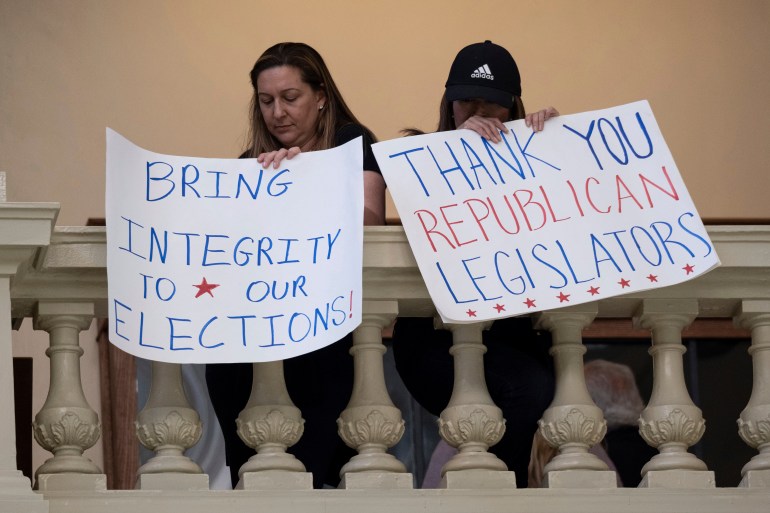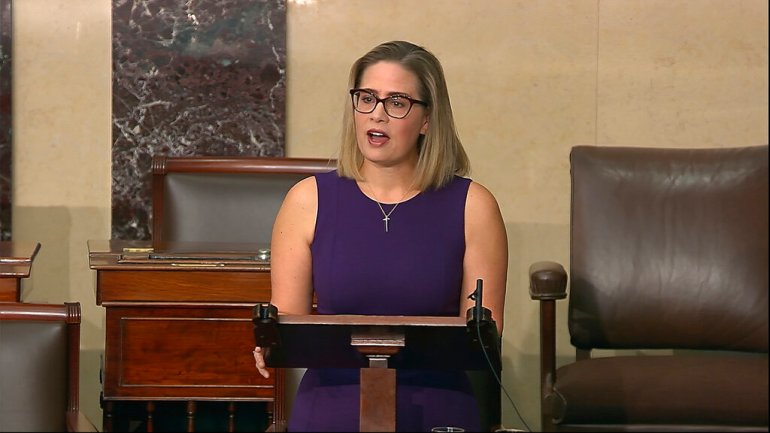Voting rights: Is US democracy really in danger?
The US Senate is poised for a showdown debate over voting rights as Republicans in states pass restrictions.

As the US commemorates the death of slain Black civil rights leader Martin Luther King Jr, 54 years after his assassination, the battle over voting rights will take centre stage in Washington DC this week as Democrats in the US Congress push a set of sweeping election reforms over Republican objections.
The rhetoric has gotten heated with President Joe Biden accusing Republicans of attacking the foundation of democracy – the right to vote – and with former President Donald Trump continuing to claim – without evidence – there was widespread election fraud in the 2020 election.
Keep reading
list of 4 itemsRussia threatens Latin America troop deployments amid US tensions
US House panel subpoenas social media giants in Jan 6 probe
It is time for Africa to focus on getting vaccines in arms
Prominent Republicans continue to support Trump’s fraud assertions that have been disproven by dozens of defeated court cases and a number of recounts.
“Our democracy is certainly being challenged from the grassroots to school boards, library boards, all the way up to the national level,” James Thuber, a professor of government at American University in Washington, DC, told Al Jazeera. “It is a serious problem, because we’ve lost the civility that we used to have.”
Trump’s refusal to accept the results of the 2020 presidential election and attempt to overturn the vote on January 6 were unprecedented and dangerous, many analysts believe. Combined with a new drive by Republicans in state legislatures to gain control of local voting boards, observers fear Trump could try again and succeed in 2024.
Al Jazeera looks at voting rights and how American democracy is at risk.
What’s the big picture?
The push and pull between Republicans and Democrats over voting rules and efforts by both sides to gain advantage is as old as US democracy itself, political scientists say. It is an inherent part of the struggle of self-governance and a repeating debate, but one that is also fraught by the nation’s long history of racism.
The US Constitution dictates Congressional elections every two years, the next in November, and a presidential election every four years, upcoming in 2024 .
What is really at issue now is whether Trump and his Republican allies, by claiming the 2020 presidential election was stolen, can use local and state legislatures to tilt the system to their advantage and whether national Democrats can stop them.
“Trump’s ‘big lie’ has given Republicans in the states a permission framework to try to gain an advantage by changing the rules,” said Chris Sautter, a Democratic election lawyer based in Washington, DC.
“This is all about Republicans creating a more favorable playing field for them to win in ‘22 and ‘24,” Sautter told Al Jazeera.

What’s going on in the states?
In 2021, 19 US states passed 34 new laws that voting advocates say restrict access to the ballot box, according to a survey by the Brennan Center for Justice at New York University. Proponents of the state laws say they are designed to restore confidence in election systems.
But the laws are more restrictive that any previous legislation since the Brennan Center began tracking state election bills in 2011. Most worrisome for Democrats, Republican legislators in some states have passed new laws that would allow partisan officials to potentially interfere with election results.
For example, in Georgia following Trump’s surprise defeat there in 2020, the Republican-controlled state legislature passed a law giving it control over membership on local election boards, which would allow Republicans to decide who adjudicates which votes count and which do not in a disputed election.
“In a very close election, you might be able to put a little bit of a thumb on the scale,” Charles Bullock, a professor of political science at the University of Georgia, told Al Jazeera.
What has President Joe Biden said?
US President Biden travelled to Georgia last week to condemn the Georgia law in harsh terms, calling it a version of “Jim Crow 2.0” a reference to post-Civil War laws enacted in the South that disenfranchised Black voters. Those laws were not reversed until the Civil Rights movement of the 1960s.
“This is nothing but punitive, designed to keep people from voting,” Biden told reporters at the White House.
Senator Raphael Warnock, a Democrat who won election from Georgia last year, called the state’s new law “anti-democratic” and “un-American”.
“They are trying to make it harder for people to vote, rather than making it easier,” Warnock said.
What’s happening in Congress?
Senate Majority Leader Chuck Schumer has announced the Senate will take up Democrat-drafted legislation beginning January 18 that would implement sweeping revisions to voting rules, including imposing federal controls on changes to US election rules in southern states like Georgia.
With the Senate equally divided between 50 Democrats and 50 Republicans, Schumer does not have the 60 votes needed to push the legislation under the Senate’s so-called filibuster rule.
At the urging of progressives and civil rights leaders, Schumer plans a parliamentary manoeuvre that would bypass Republican opposition, but he does not have full support within his Democratic caucus.

“What the Democrats are proposing on voting isn’t necessarily something that’s a top priority of Democratic voters. And I don’t think a lot of it has much of chance to pass so long as the filibuster is in place,” Kyle Kondik, an analyst at the University of Virginia Center for Politics, told Al Jazeera.
Senator Kyrsten Sinema, a Democrat from Arizona, said on Thursday she would oppose any change to the filibuster rule even though she supports the larger voting rights bill.
Where is former President Trump?
Trump meanwhile continues to exert a strong hold on the Republican Party. He repeated fraud claims at a rally Saturday in Phoenix, Arizona with Kari Lake, a former local TV anchor who is running for governor in the state. Lake has supported Trump’s claims that Biden did not legitimately win Arizona in 2020, despite three state audits that confirmed Biden’s win.
A number of recent polls have shown more than half of Republicans believe Trump’s false claims of election fraud or that Joe Biden did not win the presidency fairly.